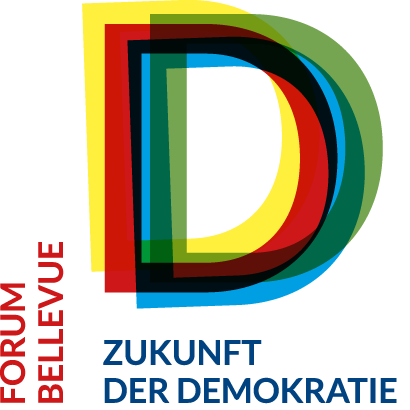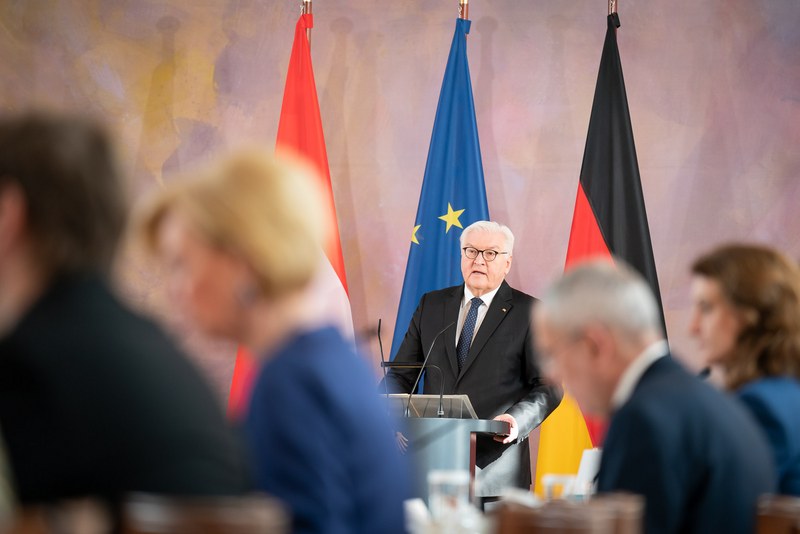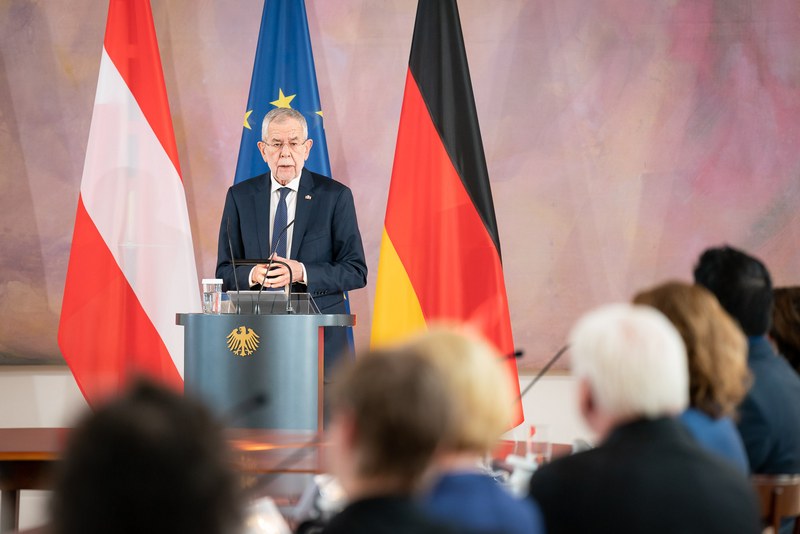Symposium “On the Future of Democracy”
March 11th, 2022
“Democracies must be able to defend themselves”
How can a republican stance be fostered in society? What can and must be done to strengthen liberal democracies both internally and externally? Those were the key questions that German Federal President Frank-Walter Steinmeier discussed with guests at Bellevue Palace during the symposium Forum Bellevue on the Future of Democracy, held at the end of his first term of office. The questions were particularly topical given Russia’s invasion of Ukraine.
The focus was on taking stock of Forum Bellevue on the Future of Democracy, the series of events held regularly since 2017 in cooperation with the Bertelsmann Stiftung. National and international panelists from academia, culture and the media who had participated in the previous 12 events were once again invited by the Federal President to attend. Guest of honor was the Federal President of the Republic of Austria, Alexander Van der Bellen.
“How can we strengthen the republic?”
In his opening remarks, Federal President Steinmeier expressed his deep concern about the Russian invasion of Ukraine, saying it had come as a shock to many people. The Ukrainian people’s struggle against a militarily superior Russian aggressor has made the world “dramatically” aware that “freedom and democracy are not guaranteed forever,” he said, noting that Putin’s war of aggression has also caused the Western democracies to close ranks. All of them now face the task of “strengthening their own defense capabilities and those of the alliance,” he said. “Democracies must be able to defend themselves.” It is a mistake to underestimate the strength of democracies,” he noted. “The experience of confusion and uncertainty, of complexity and contingency, the experience that in our lives and in our world many things are possible, but nothing can be taken for granted – precisely that is not an argument against liberal democracy, but a strong argument for it,” Steinmeier said.
In a democracy, the people always exist in the plural, whereas dictatorships recognize only supporters and enemies, the subservient and the outcast, the Federal President said. He emphasized that democracy cannot be taken for granted. At the end of his remarks, Steinmeier called on the public to become more involved, saying people should not see themselves as “customers of the state” but “citizens of the state who step in and participate and care about more than just themselves.”
Austria’s Federal President Van der Bellen then paid tribute to the victims of the war in Ukraine and called for more appreciation of democracy: “After all, in our system it is impossible for a head of state to act against the interests of his own people, for people to be imprisoned for expressing their opinions, for a war to be started that the public does not want.” He, too, emphasized that “democracy is difficult, strenuous. It requires listening and discussion, and it requires honest compromises. And that is why we should not denounce compromises as taking the easy way out. After all, solving problems together is democracy’s true strength.”
He also took a critical look at the effect disinformation has on a democracy, saying it must be exposed and labeled as a lie. He described the algorithms underlying social media as a threat to democracy: “They have become […] a digital veil that many of us have drawn between ourselves and reality. A veil that filters and changes our view of reality.” He noted that it is “unworthy of a liberal democracy that these algorithms have a massive, formative influence – at least for many – on our everyday consciousness, even though we do not know how they are constructed. We only see the consequences, and they suggest […] that profits are being made off lies, that truth and facts are being relativized.”
Western democracies stand united
During the ensuing discussion, it repeatedly became clear which challenges arise from the concrete threat that democracies face from within and without, and how those challenges can be overcome.
Liz Mohn, honorary member of the Bertelsmann Stiftung Board of Trustees, emphasized that “social systems around the world will change. Business will play a special role here. We need academia, politics and business to work together.”
Wolfgang Merkel, former director of the Democracy and Democratization department at the Berlin Social Science Center, stressed that the West’s current unity is very much at risk. It depends on how much longer the war continues and how severe the consequences are, he said, noting that sooner or later fault lines would make themselves felt in our societies. According to Merkel, the freedom to express political opinions in democracies is what makes it possible to criticize policies and politicians. Frictions between different social groups will erupt and that is a functional weakness of democracy, he explained. Political scientist Daniela Schwarzer, alluding to Russia, lamented that the danger emanating from autocracies has long been underestimated.
According to US political scientist Daniel Ziblatt, the main responsibility democracies have at this time is to find an answer to the question of how inclusive societies can be successfully created, while Ivan Krastev, head of the Center for Liberal Strategies in Sofia, called on Western democracies to be even clearer about what they stand for. They have had too many illusions about the world and could have seen quite a while ago what Putin was up to, he said. “We have not understood what this is all about. Moral clarity also means naming things […] and that is one of the things democracies at the moment are not great at.”
In a similarly critical vein, US philosopher Susan Neiman reflected on the current situation, warning against using the moral clarity that suddenly seems present given Russia’s monstrous invasion of Ukraine to “breathe a sigh of relief” over the fact that good and bad finally exist again. “We should put our own house in order,” she said.
Another aspect that could be helpful in understanding the current political situation was mentioned by Ute Frevert. The historian discussed the concept of the nation, whose appeal and power can be clearly seen in Ukraine, she said. “We cannot forget that, for many people, the concept of the nation is still crucial when it comes to defining identity. Many of the culture wars in our own country can be traced back to the decline in the sense of belonging.”
The sociologist and religious educator Mouhanad Khorchide reminded the participants that in the Middle East, democracy is often seen as the product of European countries and colonialism. The director of the Center for Islamic Theology at the University of Münster noted that democracy must not become “the exclusive identity of one continent.” Basic democratic values should not be thought of only in European terms, he said, but as a model that as many people as possible can identify with.
Complexity as democracy’s breaking point
Western democracies are facing challenges not only from without, but also from within. Author Ian McEwan observed that, with regards to British society, the internal erosion of democratic beliefs also has to do with the lack of participation of broad segments of the population, and called for a better distribution of wealth and opportunities. “If we don’t address that, democracy will always be very frail, very vulnerable,” he said.
Transformation researcher Maja Göpel called attention to the non-state power structures that can also destabilize democracies “through the concentration of power, through economic power and the way we’ve organized societies – through increasing funding and large concentrations of money and spheres of influence.”
Author Thea Dorn highlighted the importance of complexity, noting that she understands the need for clarity and the division of the world into good and bad. At the same time, she is afraid of this longing, she said, since it means a person has already adopted the logic of war. According to the writer and television host, democracy’s strength is also its drawback. People need to be less irritated when dealing with social and political complexity, she said, since this complexity is the true core of an open society.
Maren Urner, professor of media psychology, explained that three components above all are needed to view complexity as an advantage: a sense of belonging, habitual practices and new narratives. If the sense of belonging is not nurtured, then fear arises, as it does when habitual practices collapse, she said, although shared narratives can provide us with new perspectives and goals.
Sociologist Hans Joas agreed with Dorn’s plea for an unexcited response to complexity and a correspondingly critical attitude towards purported moral certainties. What is lacking in politics, he observed, is the desire to understand the motives of those people who reject democratic values. Once it has become evident that there is diminished trust in democratic institutions, the question that necessarily follows is: “Why have people lost trust in institutions? When?” The refugee crisis and the difficulties experienced with vaccine opponents are a prime example of how political and scientific elites become disconnected from parts of the population, he explained. According to Joas, such incongruities eventually become evident in democratic societies in particular, and it is therefore necessary to ask how people generally perceive science and politics. Like the philosopher Susan Neiman, Joas called on Western democracies to be more self-critical.
The chairwoman of the German Ethics Council, Alena Buyx, took Thea Dorn’s remarks as an opportunity to reiterate that it now seems tempting to revert to an overly simplified framework of good and bad. At the same time, she said, people seem to be tired of “post-modern arbitrariness,” and a response is required to this as well. Neither of these paths will lead us to the goal, which is why a third is needed, she explained. According to Buyx, substantive corridors must be defined, within which a “clear-cut” discussion of “right and wrong” needs to take place. As a society, we can only develop resilience if we remain “capable of defending ourselves,” she said, noting she would like to see more courage in this regard.
Media scholar Bernhard Pörksen added another perspective to the debate by observing that most crises require a rapid focus, a consensus on reality, and immediate action – something that is antithetical to a media infrastructure which tends toward “consensus discrimination.” According to Pörksen, the challenge is to create a space for discourse that allows for open-ended debate and that is not subject to false incentives, which he sees in the principles of “overheating” and “stoking the fire.” An important starting point for strengthening democracy, he noted, is fostering media literacy.
Following the three-and-a-half-hour debate, Alexander Van der Bellen took the floor once again. He thanked everyone for the interesting discourse, emphasizing the ability people have to deal with complexity as a matter of course. At the same time, he said, in their daily work politicians are often faced with the task of making decisions based on current necessities, decisions that cannot always meet all the demands arising from complexity. Federal President Steinmeier also thanked the participants and expressed the hope that it would be possible in another context to continue discussing the ideas and issues raised during the symposium.



